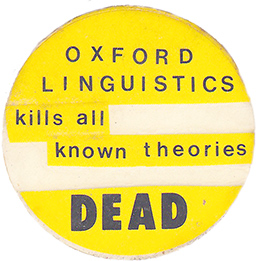What is Integrationism?
Integrationism is a new development in the theory of communication. The integrationist approach emerged from the work of a group of linguists at the University of Oxford during the 1980s and has since been developed internationally. Integrationism has far-reaching implications for many social, political, legal, philosophical and psychological issues of our time. It offers a radical departure from traditional Western assumptions about language and communication.
- it abandons the idea of communication as a 'sender-receiver' process
- it rejects code-based and rule-based models of language
- it questions the existence of any natural or universal distinction between language and non-language
- it discards the notion of separate, independent 'channels' of communication
The radical integrationist alternative is to treat communication as an open-ended continuum of integrated activities, shaped by the initiative of individuals. This means
- that there is continuous and simultaneous creation of meaning at all levels of interaction, both verbal and nonverbal
- that all signs are products of the communication situation
- that there are no autonomous, context-free signs
From an integrationist perspective, the primary function of the sign is to integrate an individual's past, present and (anticipated) future experience. That is an essential prerequisite for making sense of any situation in which we are involved. Without it, there can be no question of communication.
The integrationist agenda for a modern literate society is a programme of demythologization. It includes the following interrelated objectives:
- demythologizing linguistics as currently taught in schools and universities
- demythologizing the relationship between speech and writing
- demythologizing the public discourse of the arts and sciences


